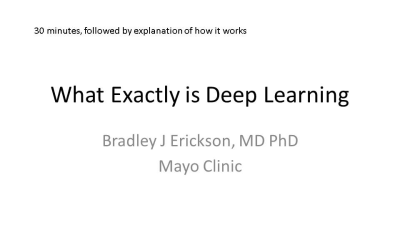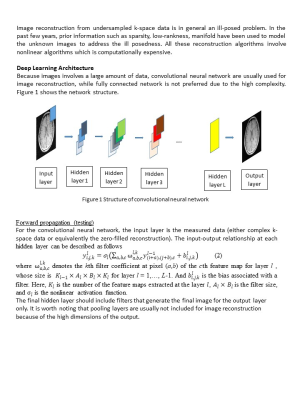|
Weekend Educational Course
Deep Learning: Everything You Want to Know |
|
Deep Learning: Everything You Want to Know: Part 1
Weekend Course
ORGANIZERS: Daniel Sodickson, Joshua Trzasko
Saturday, 16 June 2018
| N01 |
08:00 - 09:30 |
Moderators: Dong Liang, Joshua Trzasko |
Skill Level: Basic
Session Number: WE-08A
Overview
In this session, we will broadly overview Deep Learning, introducing exactly what it is, how it is different from prior Machine Learning methods, discuss applications, explain how it works under the hood, and clarify its limitations and cautions about its use.
Target Audience
Anyone interested in learning more about what Deep Learning is, how it works, and what it can and (at least currently) cannot do.
Educational Objectives
As a result of attending this course, participants should be able to:
-Explain the differences between Deep Learning and standard machine learning;
-Explain the basic training and execution mechanics of Deep Learning;
-Describe example applications in MRI where DL can be used;
-Recognize limitations and challenges of using DL in emerging applications; and
-Discuss the potential clinical impact of DL on field of MRI.
08:00
|
 |
 What Exactly Is Deep Learning? What Exactly Is Deep Learning?
Bradley Erickson
Deep learning has captured much attention because in many image recognition tasks, it surpasses human performance. The potential for this technology in radiology is substantial, and this talk will describe some of the areas in which deep learning has been or soon will be applied to improve radiological practice.
|
08:30
|
|
 Nuts & Bolts: How Does DL Work? Nuts & Bolts: How Does DL Work?
Thomas Pock
In this talk I will highlight connections between recent deep neural networks and classical methods for solving inverse problems in computer vision and image processing. I will focus on variational methods, graphical models which are known to be extremely flexible and also come along with a deep theoretical understanding. It turns out that many iterative algorithms for solving variational and graphical models can be unrolled and hence interpreted as layers in a deep neural network. The structure provided by these methods helps in reducing the number of model parameters and hence are less prone to overfitting. Moreover, the structure helps in interpreting the learned model parameters. I will show applications to stereo, motion and image reconstruction.
|
09:00
|
|
 Limitations & Caveats of Deep Learning Limitations & Caveats of Deep Learning
Jeffrey Fessler
This presentation will describe data-driven methods for image reconstruction, including adaptive dictionaries, sparsifying transforms, convolutional neural network (CNN) models, and deep learning techniques. It will also discuss limitations and challenges of such methods.
|
09:30
|
|
Break & Meet the Teachers |
|
| |
|
Deep Learning: Everything You Want to Know: Part 2
Weekend Course
ORGANIZERS: Daniel Sodickson, Joshua Trzasko
Saturday, 16 June 2018
| N01 |
10:00 - 11:30 |
Moderators: Dong Liang, Joshua Trzasko |
Skill Level: Basic
Session Number: WE-08B
Overview
In this session, we will broadly overview Deep Learning, introducing exactly what it is, how it is different from prior Machine Learning methods, discuss applications, explain how it works under the hood, and clarify its limitations and cautions about its use.
Target Audience
Anyone interested in learning more about what Deep Learning is, how it works, and what it can and (at least currently) cannot do.
Educational Objectives
As a result of attending this course, participants should be able to:
-Explain the differences between Deep Learning and standard machine learning;
-Explain the basic training and execution mechanics of Deep Learning;
-Describe example applications in MRI where DL can be used;
-Recognize limitations and challenges of using DL in emerging applications; and
-Discuss the potential clinical impact of DL on field of MRI.
10:00
|
 |
 Applications: Image Acquisition & Reconstruction Applications: Image Acquisition & Reconstruction
Leslie Ying, Dong Liang
Deep learning, as a powerful tool for artificial intelligence, has attracted a lot of attention in the MRI community. Recently deep learning has shown success in image acquisition and reconstruction. It has demonstrated some unique benefits over the existing methods. This course will teach how to use deep learning to perform image reconstruction from acquired k-space data.
|
10:30
|
|
 Applications: Image Processing, Analysis & Interpretation Applications: Image Processing, Analysis & Interpretation
Daniel Rueckert
We will give an overview of the current state-of-the-art in deep learning for medical imaging applications such as segmentation and classification. In particular We will illustrate deep learning approaches for semantic image segmentation based on Convolutional Neural Networks (CNN). We will also show how adversarial approaches can be used to train CNNs that invariant to differences in the input data (e. g. different scanners and imaging protocols), and which does not require any labelled data for the test domain. Finally, we show some applications of CNNs in the context of image classification.
|
11:00
|
|
 How to Jump-Start Your Deep Learning Research How to Jump-Start Your Deep Learning Research
Florian Knoll
This talk will provide a practical hands-on overview of how to get started in machine learning research from the point of view of an imaging lab. Common hurdles and pitfalls will be discussed via didactic examples from classification and reconstruction. The key differences of medical imaging data and computer vision applications will be highlighted. The talk will also discuss software frameworks and implementation, including code demos, which will be made available as open source.
|
11:30
|
|
Adjournment & Meet the Teachers |
|
| Back |
| The International Society for Magnetic Resonance in Medicine is accredited by the Accreditation Council for Continuing Medical Education to provide continuing medical education for physicians. |



